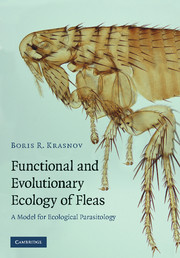Book contents
- Frontmatter
- Contents
- Preface
- Part I Brief descriptive ecology: what do fleas do?
- 1 Composition of the order
- 2 Hosts of Siphonaptera
- 3 Geographical distribution of fleas
- 4 Origin and evolution of fleas
- 5 Life cycles
- 6 Fleas and humanity
- Part II Functional ecology: how do fleas do what they do?
- Part III Evolutionary ecology: why do fleas do what they do?
- References
- Index
6 - Fleas and humanity
Published online by Cambridge University Press: 14 August 2009
- Frontmatter
- Contents
- Preface
- Part I Brief descriptive ecology: what do fleas do?
- 1 Composition of the order
- 2 Hosts of Siphonaptera
- 3 Geographical distribution of fleas
- 4 Origin and evolution of fleas
- 5 Life cycles
- 6 Fleas and humanity
- Part II Functional ecology: how do fleas do what they do?
- Part III Evolutionary ecology: why do fleas do what they do?
- References
- Index
Summary
Humans have always coexisted with fleas. This coexistence is asymmetric, usually being favourable for fleas, but unfavourable for humans. Fleas can cause direct medical damage to humans and can serve as vectors for some diseases. They can also cause indirect damage to humans by parasitizing poultry and livestock and, thus, causing economic loss (e.g. Yeruham et al., 1989). Flea damage to human pets (mainly dogs and cats) also represents a serious veterinary problem. The ubiquity of the negative effect of fleas and their role in transmission of diseases have sometimes led to these creatures being blamed even when their negative role has not been explicitly established (e.g. Moynahan, 1987). The negative aspects of fleas as they relate to the economic and medical implications to human society in both urban and rural settings are briefly addressed in this chapter.
Medical aspects
Dermatological diseases caused by flea parasitism
The most well-known medical condition caused directly by flea parasitism is tungiasis. Tungiasis is a health problem in the tropics and subtropics, especially in underprivileged communities in Latin America, the Caribbean and sub-Saharan Africa (Heukelbach et al., 2001; Eisele et al., 2003; Kehr et al., 2007). This painful parasite-inflicted disease is not exclusive to humans, but also strikes many domestic animals (Heukelbach et al., 2004). It is caused by the sand flea Tunga penetrans when the female flea burrows into the skin.
- Type
- Chapter
- Information
- Functional and Evolutionary Ecology of FleasA Model for Ecological Parasitology, pp. 68 - 76Publisher: Cambridge University PressPrint publication year: 2008
- 1
- Cited by



